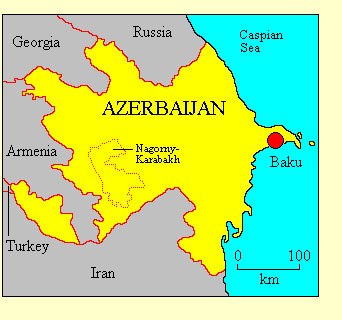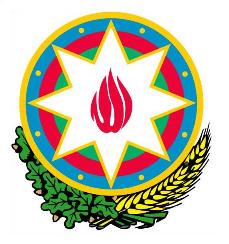

REPUBLIC OF AZERBAIJAN
• Official name: Azarbaycan Respublikasi (Republic of Azerbaijan)
• Location: West Asia
• International organisations: Commonwealth of Independent States, Council of Europe, Organisation of Islamic
Conference, Organisation for Security and Co-operation in Europe, United Nations.
• Borders: Armenia, Georgia, Iran, Russia, Turkey
• Coastline: None (Azerbaijan has a coast on the Caspian Sea, but this does not give access to the sea.)
• Land area: 86,600 Km2 (includes Nagorno-Karabakh)
• Population: 8,800,000 (includes Nagorno-Karabakh)
• Annual GDP (PPP) per capita: US$10,400 (2009 CIA estimate). World ranking: 80
• Ethnicity: 90% of the population are Azeris, a Turkic people. Minorities include Dagestani 3.2%, Russian 2.5% and (in Nagorno-Karabakh)
Armenian 2%
• Languages: Azeri is the official language and is spoken by 90% of the population.
Russian is widely used. In Nagorno-Karabakh 2% speak Armenian.
• Religion: Most Azeris are nominal Moslems but religious practice is low. There is a 5% Orthodox Christian minority.
• Form of government: In form, a presidential republic, in practice a dictatorship. Azerbaijan is divided into 59 districts and
11 cities.
• Capital: Baku
• Constitution: The Constitution of the Republic of Azerbaijan came into effect on 12 November 1995.
• Head of state: The President, elected by direct universal suffrage for a five-year term.
• Head of government: The Prime Minister, appointed by the President and in practice accountable to him.
• Legislature: Azerbaijan has a unicameral legislature, the National Assembly (Milli Meclisi), which has 125 members: 100 elected for five-year terms from single-member constituencies and 25 elected by proportional representation. (From the next election all members will be elected from single-member constituents.)
• Electoral authority: The Azerbaijan Central Election Commission administers
national elections.
• Freedom House 2011 rating: Political Rights 6, Civil Liberties 5
• Transparency International Corruption Index: 24% (134 of 178 countries rated)
• Reporters Without Borders Press Freedom 2010 Index: 43.6% (152 of 178 countries rated)
• Heritage Foundation Economic Freedom 2010 Index: 59.7% (92 of 178 countries rated)
Political history
The Azeri-speaking lands were under the control of the Persian Empire until the early 19th century, when Russia penetrated the area
and in 1828 annexed the territory of the present republic, leaving the majority of Azeris inside Persia. The area assumed great importance
with the discovery of oil at Baku in the 1890s. When the Russian Empire collapsed in 1917 Baku was occupied by the Turks, and there was a
short-lived Azerbaijan Republic in 1918-20.
The Russian Communists gained control of the area in 1921 and Azerbaijan was incorporated into the Transcaucasian Federated Soviet
Socialist Republic. Azerbaijan became a separate republic within the USSR in 1936. The Nakhichevan enclave was also added to Azerbaijan,
but the Nagorno-Karabakh region, inhabited mainly by Armenians, was made an autonomous region within Azerbaijan.

When Soviet power collapsed in 1991, Azerbaijan declared its independence. Azerbaijani independence was complicated by a war with
Armenia over Nagorno-Karabakh, in which Azerbaijan lost not only Nagorno-Karabakh but also the territory lying between it and Armenia
proper. About 20% of Azerbaijan's territory is now occupied by Armenia.
Azerbaijan has had a chaotic history as an independent country, with presidents
forced from office by mob violence and bitter ethnic conflict. In 1993 Haidar Aliyev,
who had been the local Communist Party chief from 1969 to 1987, came to power and
established a regime which became increasingly authoritarian, although opposition
to the government remained possible. In October 2003 Aliyev died and was succeeded by his son
Ilham Aliyev, who easily won presidential elections in 2003 and 2008.
Azeri politics is dominated by Aliyev's New Azerbaijan Party (YAP), a personal
vehicle for the president. The main opposition parties are the Equality Party and the
Azerbaijan Popular Front Party, which led the fight for independence.
Freedom House's 2011 report on Azerbaijan says:
"Azerbaijan is not an electoral democracy. The country's constitution provides for a strong presidency, and the parliament, the 125-member
Milli Majlis, exercises little or no independence from the executive branch... Elections since the early 1990s have been considered
neither free nor fair by international observers. As with previous votes, the 2010 parliamentary balloting featured the abuse of state
administrative resources, including news media, to ensure the dominance of the YAP. The OSCE also cited voter intimidation and the improper
disqualification of some opposition candidates. Corruption is widespread, and wealth from the country's massive oil exports creates ever
greater opportunities for graft... While Azerbaijan's constitution guarantees freedom of speech and the press, the authorities severely
limit press freedom in practice... The government restricts freedom of assembly, especially for opposition parties...
The judiciary is corrupt, inefficient, and subservient to the executive branch. Arbitrary arrest and detention are common, particularly
for members of the political opposition."
Updated October 2011
|

